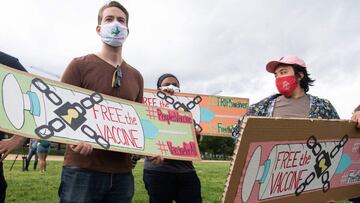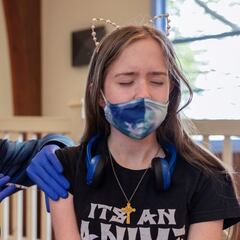US supports waiving vaccine patents: what does it mean and how will it affect the pandemic?
The White House has confirmed that it will support easing patent restrictions on covid-19 vaccinations in an attempt to boost global immunity levels.


The Biden administration has confirmed that it will support an easing of global patent rules on pharmaceuticals to help ensure that people in developing countries are given access to life-saving coronavirus vaccines.
The news was announced on Wednesday after weeks of debate on the logistics and the morality of opening up the potential availability of privately-developed vaccinations. The move has already faced strong pushback from drug manufacturers and this announcement is no guarantee of a swift change of policy.
What has the White House said about waiving vaccine patents?
The news was announced in a statement released by US Trade Representative Katherine Tai on Wednesday. Both she and Biden have been speaking to advocacy groups and non-governmental organisations about the possibility of implementing waivers of patent restrictions as they apply to covid-19 vaccinations.
The proposals were first mooted by India and South Africa, both of whom are suffering spikes in coronavirus cases caused in part by particularly dangerous local variants. Before making the announcement, Tai and other White House officials met with around 25 stakeholders to get their take on the vaccine patent debate.
These extraordinary times and circumstances of call for extraordinary measures.
— Ambassador Katherine Tai (@AmbassadorTai) May 5, 2021
The US supports the waiver of IP protections on COVID-19 vaccines to help end the pandemic and we’ll actively participate in @WTO negotiations to make that happen. pic.twitter.com/96ERlboZS8
Tai’s statement read: "The Administration's aim is to get as many safe and effective vaccines to as many people as fast as possible.
"As our vaccine supply for the American people is secured, the Administration will continue to ramp up its efforts - working with the private sector and all possible partners - to expand vaccine manufacturing and distribution. It will also work to increase the raw materials needed to produce those vaccines."
What happens next if the vaccine patents are waived?
Only last week, White House Chief of Staff Ron Klain told CBS News that Tai would be holding talks with the World Trade Organization "on how we can get this vaccine more widely distributed, more widely licensed, more widely shared."
It came after the scale of India’s battle against the coronavirus was becoming fully apparent with 20 million confirmed cases, and a real number that is thought to be far higher. The country is running out of oxygen supplies to treat patients, as is also the case in neighbouring Pakistan and Bangladesh.
Historic decision by @potus who heard the calls of India, South Africa and progressive forces around the world. As I have argued, the EU should support a global waiver on patent protections for vaccines. No more time to waste. Lives before profits.#CovidVaccines
— Alexis Tsipras (@tsipras_eu) May 5, 2021
It is hoped that the removal of some key restrictions associated with vaccine patents will allow other countries to manufacture better vaccinations and to make them more efficiently. However for that to materialise there also need to be what is known as a “tech transfer”, by which the vital information and personnel is passed on.
Related stories
Gregg Gonsalves, a Yale University epidemiologist who has been a long-time support of a patent waiver, said that today’s news “is a start” but that it is the process of passing on the information that is vital.
He continued: “We need the writing of the text of this waiver now to be transparent and public, but as we have always said we need tech transfer now.”

